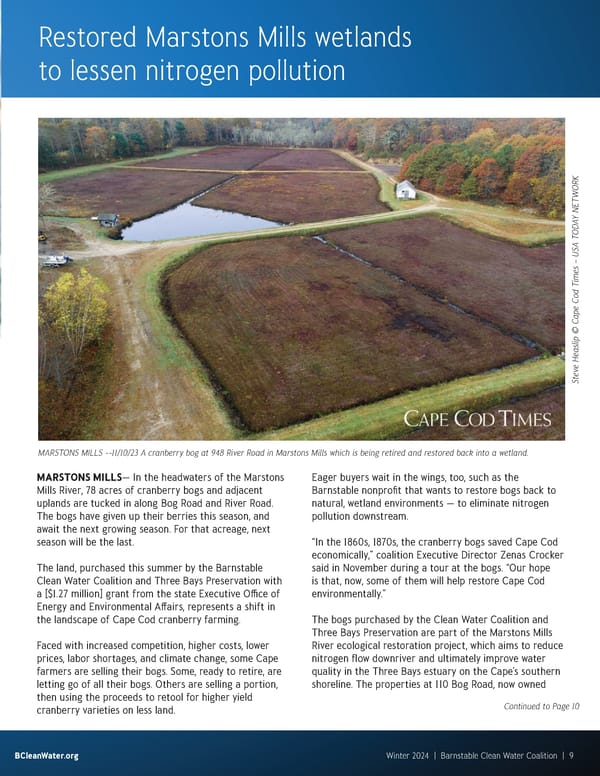Restored Marstons Mills wetlands to lessen nitrogen pollution K R O ETW Y N A D O T es – USA im d T o e C ap aslip © C e He v te S MARSTONS MILLS --11/10/23 A cranberry bog at 948 River Road in Marstons Mills which is being retired and restored back into a wetland. MARSTONS MILLS— In the headwaters of the Marstons Eager buyers wait in the wings, too, such as the Mills River, 78 acres of cranberry bogs and adjacent Barnstable nonpro昀椀t that wants to restore bogs back to uplands are tucked in along Bog Road and River Road. natural, wetland environments — to eliminate nitrogen The bogs have given up their berries this season, and pollution downstream. await the next growing season. For that acreage, next season will be the last. “In the 1860s, 1870s, the cranberry bogs saved Cape Cod economically,” coalition Executive Director Zenas Crocker The land, purchased this summer by the Barnstable said in November during a tour at the bogs. “Our hope Clean Water Coalition and Three Bays Preservation with is that, now, some of them will help restore Cape Cod a [$1.27 million] grant from the state Executive O昀케ce of environmentally.” Energy and Environmental A昀昀airs, represents a shift in the landscape of Cape Cod cranberry farming. The bogs purchased by the Clean Water Coalition and Three Bays Preservation are part of the Marstons Mills Faced with increased competition, higher costs, lower River ecological restoration project, which aims to reduce prices, labor shortages, and climate change, some Cape nitrogen 昀氀ow downriver and ultimately improve water farmers are selling their bogs. Some, ready to retire, are quality in the Three Bays estuary on the Cape’s southern letting go of all their bogs. Others are selling a portion, shoreline. The properties at 110 Bog Road, now owned then using the proceeds to retool for higher yield Continued to Page 10 cranberry varieties on less land. BCleanWater.org Winter 2024 | Barnstable Clean Water Coalition | 9
 BCWC Fall23Winter24 Newsletter Page 8 Page 10
BCWC Fall23Winter24 Newsletter Page 8 Page 10